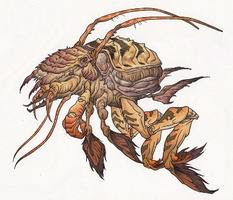Water Beetle (giant)
| Species | insect (hygrobus gargantua) |
| No. Appearing | 5–20 |
| Behaviour | solitary |
| Range | intertidal, subterranean (pool), wetland |
| Size | 6 ft. long (legs drag up to 7 ft.) |
| Weight | 560 lbs. |
| Intelligence | 0 |
| Armour Class | 4 |
| Hit Dice | 4 |
| Action Points | 5 |
| Max. Stride | 2 |
| THAC0 | 18 |
| Hp/Die | d10 |
| Attack Forms | pincers |
| Damage | 3–12 |
| Special Attacks | camouflage, squeak |
A water-dwelling beetle that has lost the ability to leave the water, the legs having adapted a heavy growth of spiny-hairs that propel it upwards to break the surface and attack prey.
The hygrobus beetle usually swims about 2 to 4 feet below the water's surface. Because of its striped black and brown markings, which camouflage it against the movement of the waves, it is impossible to see it waiting if one is swimming in the water.
These beetles are found throughout temperate, sub-tropical and tropical climes. They cluster around shorelines, particular at the outflow of rivers. They have been known to seize victims standing close to the water's edge, dragging them into a body of water to a depth of 15 feet, where they are pulled apart and consumed.
The beetle breathes air and must rise to the surface every 20–30 minutes, whereupon it refills twin bladders behind its eyes with a new air supply. When surfacing, it will emit six piercing squeaks in quick succession, that sound like the turning of a wagon wheel lacking oil. These squeaks are very loud and have the effect of drawing birds from up to half a mile away, who interpret the sound as a bird call. Thus, the primary diet of the hygrobus beetle is waterfowl of all varieties; occasionally, however, the beetle will successful bring larger avians, such as pegasi, hippogriffs or griffons, causing a rider to lose control of these animals as they are mesmerized into landing onto the surface of the lake where the squeaking originates. These avian beasts are often a match for the beetle, of course, but occasionally the beetle does succeed in winning these contests.
See Bestiary
